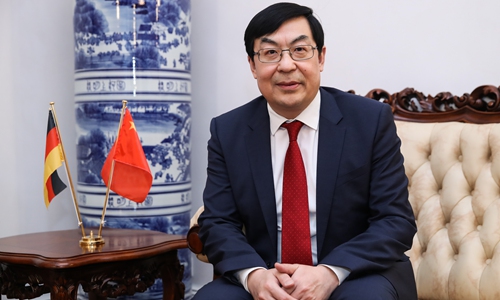
Wang Weidong, commercial counselor of the Chinese Embassy in Germany. (Photo/Courtesy of Chinese Embassy in Germany) The discussion on whether to involve Huawei in European countries' 5G rollouts has been politicized by some politicians of the continent, senior Chinese officials and experts said on Monday. They noted that European countries, which have reaped massive benefits from the Chinese market, should make a cautious choice on whether to follow unreasonable U.S. bullying of the Chinese firm or cooperate and achieve win-win results with China in the coming era. A right decision will not only get European countries a ride on the fast track of future technology development, but also offset a new era for China-EU cooperation that brings tangible benefits for both sides, they said. The comments came as politicians in European countries such as Germany, under pressure from the U.S., appear divided on whether to exclude Huawei from their 5G rollouts. The German government reportedly delayed a decision on Germany's 5G rollout and may ban the Chinese tech company until 2020. Some media reports hinted that the decision may be announced as early as in January. Barring Huawei in Germany for so-called national security reasons would be a "discriminative and unjust" decision, Wang Weidong, commercial counselor of the Chinese Embassy in Germany, said in an exclusive interview over the weekend. If Germany passes laws that bar Huawei from participating in local 5G construction without showing solid evidence, China will not "sit idle," Wang said, noting that companies from the European nation have reaped massive benefits from the Chinese market. "Germany's firms have been operating in China and participating in the construction of local industries for years, and benefiting a lot from the Chinese market," Wang said. "If Huawei is excluded, it will release both a wrong signal of protectionism and a negative message to China-Germany economic cooperation and even cause a setback for bilateral relations." Such a decision would also take an "immensurable" toll on local consumers, telecom operators and the German economy, Wang asserted. "The local telecom operators will pay extra time and costs for the 5G rollout," Wang said. "The time for 80 million consumers in Germany to receive 5G signals will be delayed. More importantly, Germany may miss the opportunity to take a ride on digital transformation due to a weak digital infrastructure." Chinese Ambassador to the UK Liu Xiaoming also said in a signed article published in the Sunday Telegraph that banning Huawei would leave the country trailing behind on technology. "Banning Huawei means back-pedal for Britain," Liu said. British telecommunications operators have admitted that banning Huawei equipment would delay Britain's 5G rollout, Liu noted, leaving it trailing far behind in this latest industrial revolution. A Chinese official familiar with China's policy toward Europe told the Global Times that Huawei has now become a political issue, not a purely technical issue. "Reasoning alone will not work. In the follow-up, some economic means, including countermeasures, are necessary to deal with it," the official said. Setback China was clarifying its bottom line, and if the EU bans Huawei, that means protectionism will dampen the relationship with China, said Cui Hongjian, director of EU Studies at the China Institute of International Studies in Beijing. Relations are at a critical point this year, Cui warned. The EU could have made a wise choice and found a balanced position between China and U.S., he noted. Zhao Junjie, a research fellow at the Chinese Academy of Social Sciences' institute of European studies, said that if the EU welcomed Huawei, China-EU relations can enter a new era where both sides have more say in the latest industrial revolution. "Taking advantage of Huawei's 5G strength, which is the foundation for all the technologies in the latest industrial revolution, European countries such as Germany, which are superior in traditional manufacturing sectors, will maintain their advantages in the coming new era," Zhao said. |